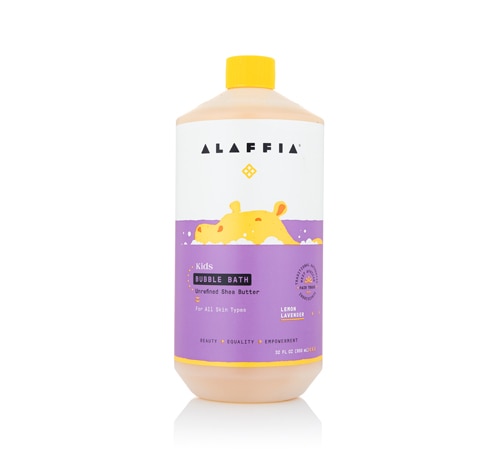[vc_row][vc_column][vc_column_text]Olowo-n’djo Tchala puts forward a new business model, one based on giving workers dignity, cultural respect, full transparency, fostering goodness, all while still making a profit. He says for a business to thrive, you have to become adept at listening.
The Upside caught up with Olowo-n’djo Tchala, the founder of Alaffia, when he was in Ghana spearheading a new reforestation project. Because Tchala’s story was so heavily influenced by his mother’s role in his life, we began with questions about his early childhood.
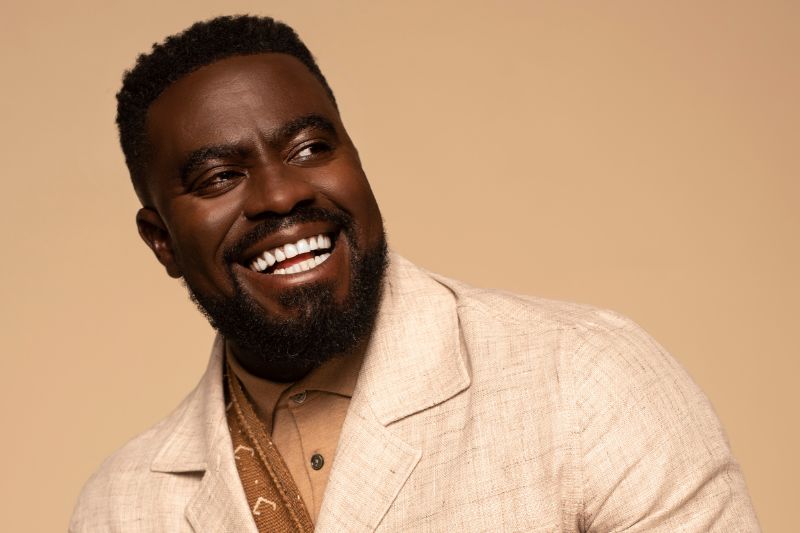 The Upside:
The Upside: What was the spiritual ground of your childhood?
Olowo-n’djo: I would say in some ways my mother. She created a form of routine that made you feel protected. She also was a kind of a guide. You knew that when things went wrong, she'll be there. I know that's what all mothers are supposed to do. But my mother has eight children and we grew up in this 8 by 10 room. A very small room but at 4:00 o'clock in the morning or latest 4:30, when you're up, the first thing you do is you get on your knees and you thank her for bringing you to life. Then she will tell you anything that you did wrong the day before. She would also tell you everything that you've done right. And then she will bless you. Every day you get up, you look forward to this kind of a blessing. It doesn't matter how hungry you may be. You walk into the day feeling blessed by the sense of approval she gives you every morning. Even when I got a little bit older, but still a young boy, she always wanted to listen to the troubles that you may have. If have any trouble, she goes and does ceremonies for you so that the prayers and the gods will be with you. She had to work as an indentured servant but she was in many ways a shaman.
 The Upside:
The Upside: What do you enjoy most about growing up in Togo?
Olowo-n’djo: I would say food. I like Togo food and particularly the pounded yams they made on the farm. I also liked going to the market. Markets have so much energy. It’s not like going to the supermarket. Everybody is selling something, everybody's trading something, there's so many different voices and languages going on. You see a broad array of fresh fruits and fresh produce. Markets are just lively with humans, lively with what humans are producing. I’m fascinated by just looking at what's happening in the market. As a child, we would go to the market on the market days. It was also a day that we didn't have to work in a farm, a day of relief and happiness. I always looked forward to market days and I helped my mother sell her wares there. She would give me a few coins to spend which made me happy.
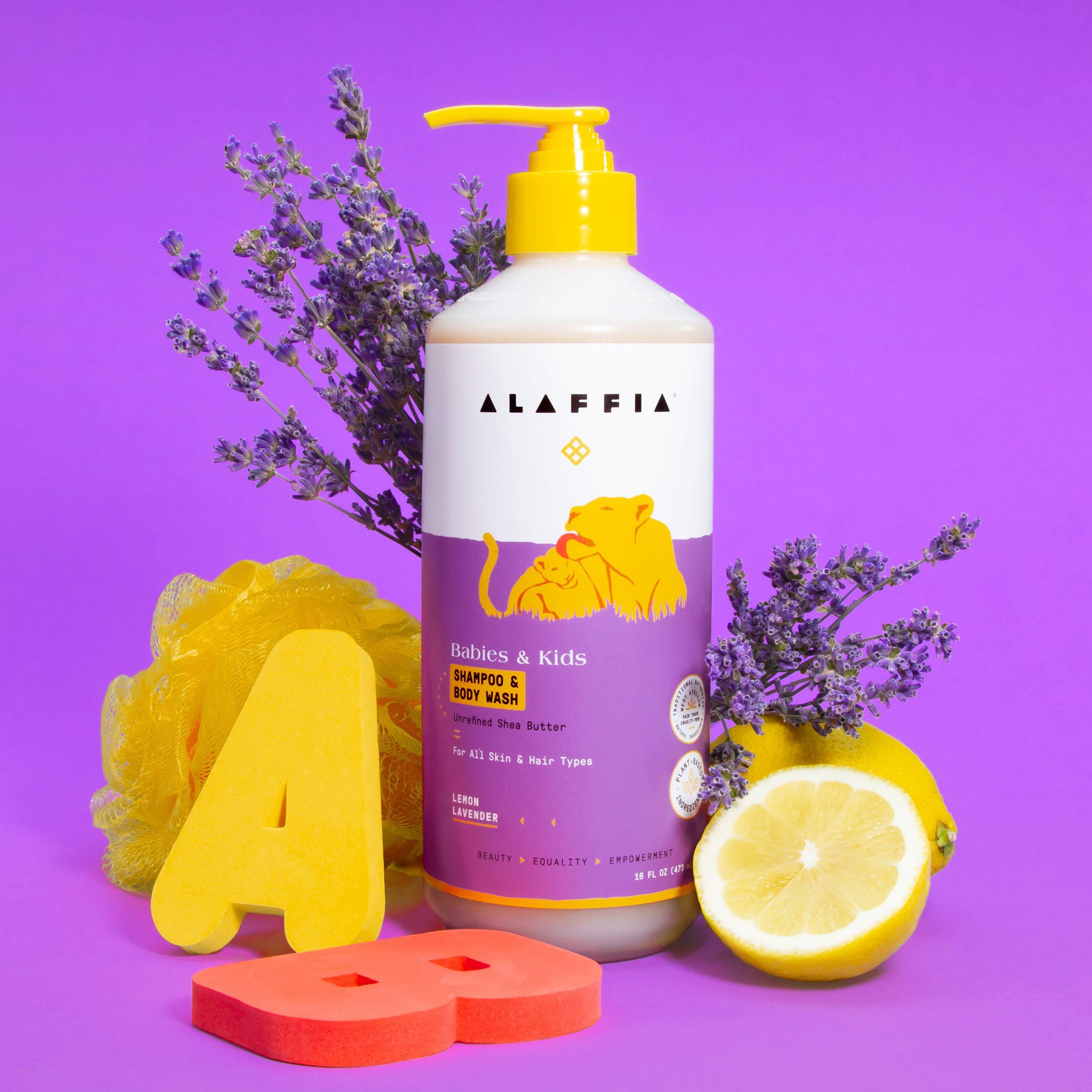 The Upside:
The Upside: You have said, “Early on I learned how to survive, how to be competitive – extremely competitive. Even today when I look at a shelf or the marketplace, it looks like a war zone to me because of how I was brought up.” This sounds a bit like trauma—what was that like to grow up with competition so intense and with such urgency it felt like a war zone?
Olowo-n’djo: To survive in the market, you have to listen. It’s interesting because you think you need eyes but it is really about listening. In the market you do a lot of bartering. The market was where I understood the complexity of our society. We have different ethnicities from different villages that will come to the market. In the current market, in the US, you have to listen to the diversity of what the customers may want. The market to me that is the place where everything is happening. If you can’t survive the market, you go back to the farm.
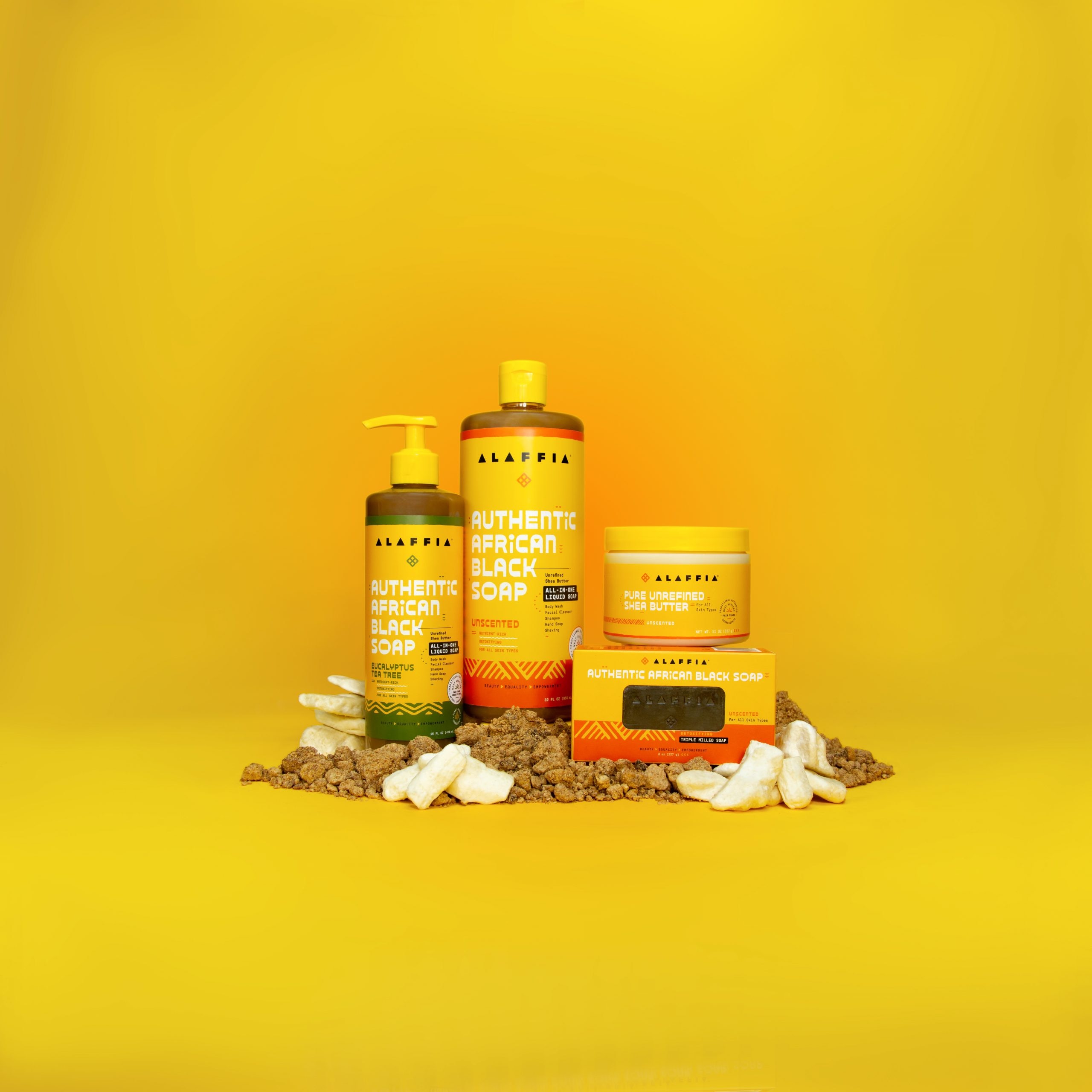 The Upside:
The Upside: You also said, in another interview, the women
Alaffia empowers through health support, education and jobs “can see the correlation of investment in the community that begins with them, not the money simply coming from the West. And that is really important – it reverses the whole psychology on who is in charge.”
Olowo-n’djo: It's actually important to me on a very personal level as well as societal. The phenomenon that exists with it anywhere you go—I'm currently in Ghana and I go to Togo next week—and you get to the villages and the reality is this essence of feeling powerless. And it’s for multiple reasons. One has to do with colonialism. As you can imagine, during the colonial period people were completely disempowered so that their resources could be extracted for nothing. And then in the post-colonial period, after the 1960’s, you have the case where in most African countries, the government simply does not represent the people, does not act in the interest of the people. People are in extreme poverty and they feel completely powerless. When you combine the current societies, the post-colonial society to the current society that we have, the mandate is that we must adopt everything that's Western. Anything that is of our own is deemed uncivilized. It is considered the equivalent of “being behind.” When you have a society that has internalized being told that you're not good enough, you have nothing to offer the world, you create a fetal situation that turns a society into a dependent.
You cannot have a dignity when you feel that somebody is a spoon-feeding you. When they don't feed you, you're hungry and you may die and your children die and you feel that there's no future for you. A society needs to feel that it has something to contribute. You need to approach the society in a way that each person can see that they have something to contribute. Even if they are not educated, they need to feel they have a skillset and it has a value. I can use my skillset to transform raw material into a product; I can earn money from my contribution. This makes people feel no, this is not hand out. This is not somebody just trying to just fix me. My handwork earned this. This creates a sense of hope. We need hope because the truth of the matter is we cannot resolve all the issues that we face globally and add global warming on top of it. What we can do, is buy time, so that solutions can come. Particularly when it comes to African issues, I do strongly believe that Africans must see themselves as part of a solution. Not as a detriment.
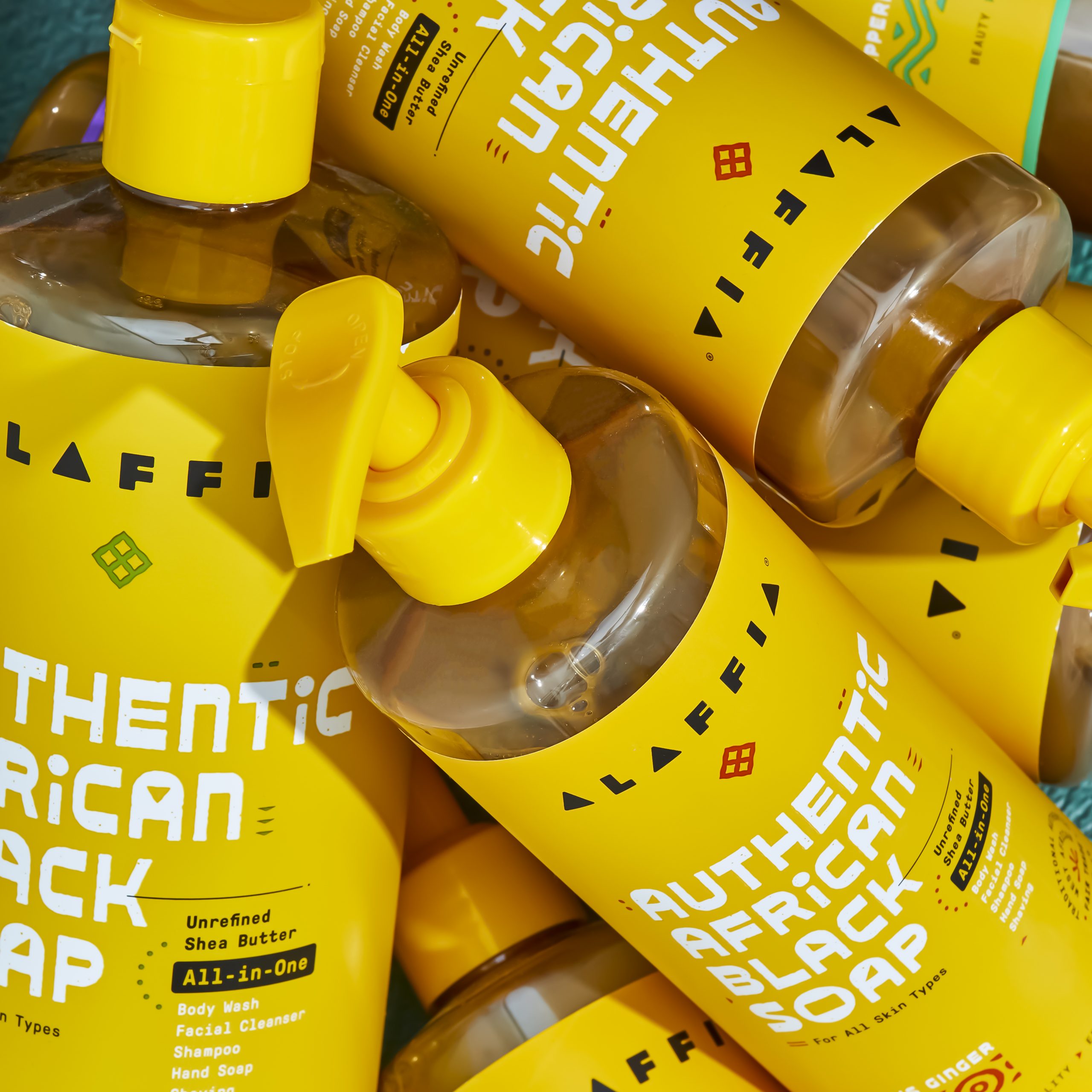 The Upside:
The Upside: What can America learn from Togo?
Olowo-n’djo: The fact is the continent of Africa is still the continent with more resources than any other continent on the planet. I think for America when it comes to commerce and trade is to look to Africa with respect. And when I say respect, to take into account the fabric of the culture. Before you engage, you need to understand it. It's not as simple as it looks. Just because people are materially poor, they don’t have two cars and SUVs, does not mean they are diminished. American commerce needs to know that there's a culture to be pay attention to before it engages with it. Because once you continue to break the society's culture, you continue to break the society itself. This can only lead to more conflict.
The second thing to know is there's a sense of collectivism. People say this often about Africa and I can tell you it is true. It's not true in many African cities, but it's true in the rural areas, in the villages where I work. The community comes together for any issue or even just to celebrate. I've been in the US for a very long time and that sense of community is not innate, you have to build your own. I think that it is so important for the human family and for America, because with all its might, most people are simply just not happy. American can learn something about community from Africa.
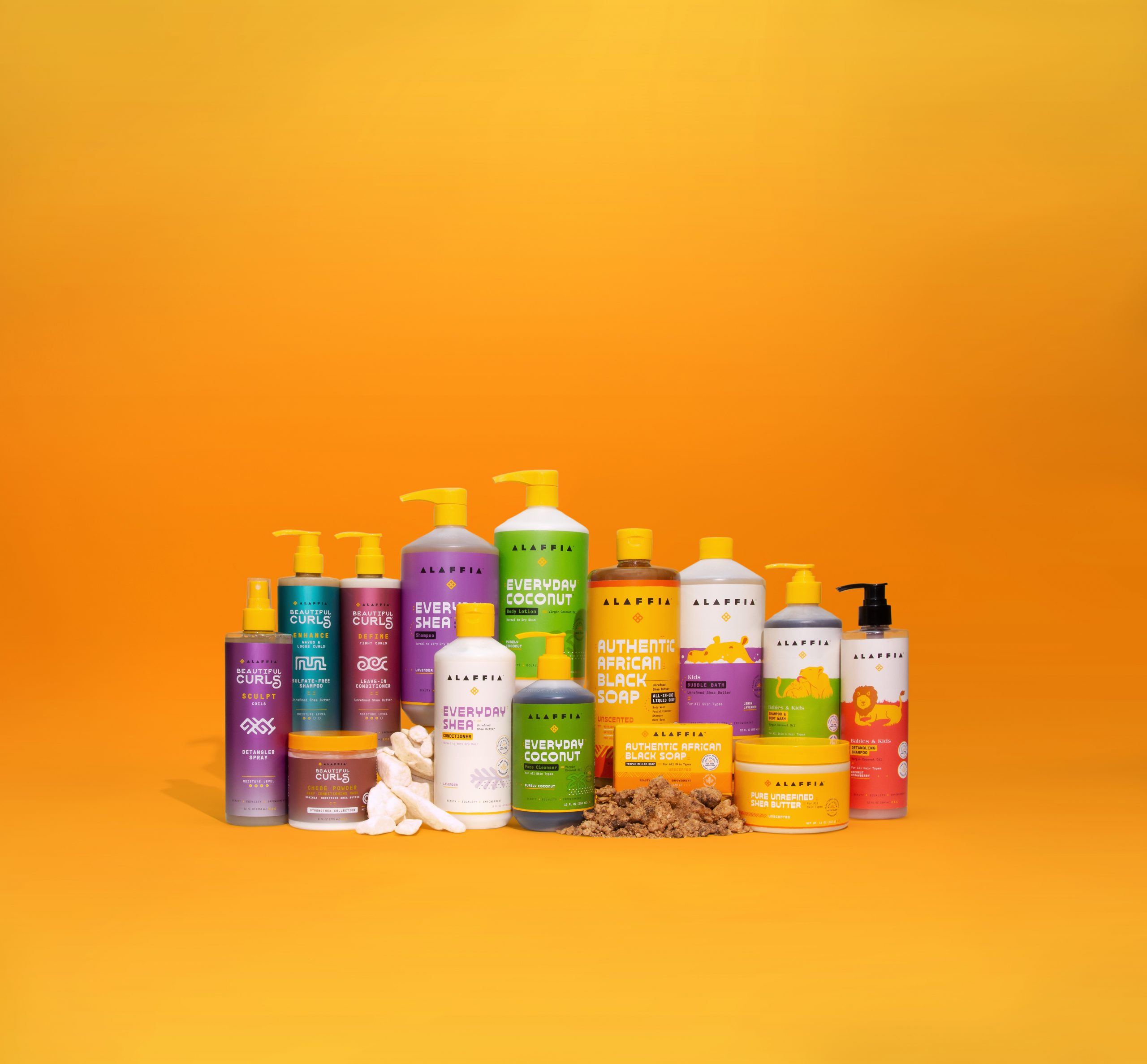 The Upside:
The Upside: Transparency is the core value for
Alaffia. You update your packaging every year to depict where the money is going, down to the cent. Can you talk about why transparency is so key?
Olowo-n’djo: I think any organization should be accountable to the public. The only way you can have accountability is if you report to the public. If we say this is what we're doing in the community, this amount of women are being assisted in having safe births, the only way it can be verified is if you publish it. It also encourages all organizations to see that they can still sell a product and still be able to foster goodness. At the end of the day, you should not be trying to hide anything. If you have nothing to hide, you might as well put it there. Unless you have something to hide.
The Upside: What’s next on the horizon for you?
Olowo-n’djo: One of the most important things for me is to really focus on reducing the impact of climate change on our communities here in West Africa. Climate change will be at the forefront for me for the rest of my life. The continent of Africa will be the one that will suffer the most from climate changes. And I see every day, I see our farmers suffering as the wind pattern changes. I see the dry areas, the trees dying in the North, the population growth exploding. People are consuming more in West Africa than ever before. Clearly we have to do something. Given the network and infrastructure that we have set up already, we can quickly pivot that into a regenerative agricultural system and build the capacity of food security for the farmers that we work with already. In fact, that's one of the reasons I'm here in Ghana right now.
Up north what is lacking are nurseries to make what I call baby trees. Everybody wants to plant trees, but you can't plant trees if you don't have baby trees. This year, in northern Ghana, we started a nursery to produce about 100,000 trees and we want to quadruple that next year.
What will happen with those baby trees, by June, is that we will distribute them to the areas that we buy Shea raw materials from so that they can have additional plants and not just cut the Shea trees down. I'm trying to encourage people to not cut any more trees down, but also be realistic that families need to feed themselves and they will cut the trees down to burn or to cook with if they have no other options. So why not give them alternatives, so that Shea trees will have more value than they would otherwise. It’s a small thing and but it
is something.[/vc_column_text][/vc_column][/vc_row][vc_row][vc_column][vc_text_separator title="Featured Products" border_width="2"][vc_row_inner equal_height="yes" content_placement="middle" gap="35"][vc_column_inner width="1/3"][vc_single_image image="173900" img_size="full" alignment="center" onclick="custom_link" img_link_target="_blank" css=".vc_custom_1711480098181{padding-right: 7% !important;padding-left: 7% !important;}" link="https://www.vitacost.com/alaffia-beautiful-curls-definetight-curls-leave-in-conditioner"][/vc_column_inner][vc_column_inner width="1/3"][vc_single_image image="173901" img_size="full" alignment="center" onclick="custom_link" img_link_target="_blank" css=".vc_custom_1711480120778{padding-right: 7% !important;padding-left: 7% !important;}" link="https://www.vitacost.com/alaffia-kids-bubble-bath-shea-lemon-balm-lemon-lavender"][/vc_column_inner][vc_column_inner width="1/3"][vc_single_image image="173902" img_size="full" alignment="center" onclick="custom_link" img_link_target="_blank" css=".vc_custom_1711480150950{padding-right: 7% !important;padding-left: 7% !important;}" link="https://www.vitacost.com/alaffia-authentic-african-black-soap-eucalyptus-tea-tree"][/vc_column_inner][/vc_row_inner][/vc_column][/vc_row]
 The Upside: What was the spiritual ground of your childhood?
Olowo-n’djo: I would say in some ways my mother. She created a form of routine that made you feel protected. She also was a kind of a guide. You knew that when things went wrong, she'll be there. I know that's what all mothers are supposed to do. But my mother has eight children and we grew up in this 8 by 10 room. A very small room but at 4:00 o'clock in the morning or latest 4:30, when you're up, the first thing you do is you get on your knees and you thank her for bringing you to life. Then she will tell you anything that you did wrong the day before. She would also tell you everything that you've done right. And then she will bless you. Every day you get up, you look forward to this kind of a blessing. It doesn't matter how hungry you may be. You walk into the day feeling blessed by the sense of approval she gives you every morning. Even when I got a little bit older, but still a young boy, she always wanted to listen to the troubles that you may have. If have any trouble, she goes and does ceremonies for you so that the prayers and the gods will be with you. She had to work as an indentured servant but she was in many ways a shaman.
The Upside: What was the spiritual ground of your childhood?
Olowo-n’djo: I would say in some ways my mother. She created a form of routine that made you feel protected. She also was a kind of a guide. You knew that when things went wrong, she'll be there. I know that's what all mothers are supposed to do. But my mother has eight children and we grew up in this 8 by 10 room. A very small room but at 4:00 o'clock in the morning or latest 4:30, when you're up, the first thing you do is you get on your knees and you thank her for bringing you to life. Then she will tell you anything that you did wrong the day before. She would also tell you everything that you've done right. And then she will bless you. Every day you get up, you look forward to this kind of a blessing. It doesn't matter how hungry you may be. You walk into the day feeling blessed by the sense of approval she gives you every morning. Even when I got a little bit older, but still a young boy, she always wanted to listen to the troubles that you may have. If have any trouble, she goes and does ceremonies for you so that the prayers and the gods will be with you. She had to work as an indentured servant but she was in many ways a shaman.
 The Upside: What do you enjoy most about growing up in Togo?
Olowo-n’djo: I would say food. I like Togo food and particularly the pounded yams they made on the farm. I also liked going to the market. Markets have so much energy. It’s not like going to the supermarket. Everybody is selling something, everybody's trading something, there's so many different voices and languages going on. You see a broad array of fresh fruits and fresh produce. Markets are just lively with humans, lively with what humans are producing. I’m fascinated by just looking at what's happening in the market. As a child, we would go to the market on the market days. It was also a day that we didn't have to work in a farm, a day of relief and happiness. I always looked forward to market days and I helped my mother sell her wares there. She would give me a few coins to spend which made me happy.
The Upside: What do you enjoy most about growing up in Togo?
Olowo-n’djo: I would say food. I like Togo food and particularly the pounded yams they made on the farm. I also liked going to the market. Markets have so much energy. It’s not like going to the supermarket. Everybody is selling something, everybody's trading something, there's so many different voices and languages going on. You see a broad array of fresh fruits and fresh produce. Markets are just lively with humans, lively with what humans are producing. I’m fascinated by just looking at what's happening in the market. As a child, we would go to the market on the market days. It was also a day that we didn't have to work in a farm, a day of relief and happiness. I always looked forward to market days and I helped my mother sell her wares there. She would give me a few coins to spend which made me happy.
 The Upside: You have said, “Early on I learned how to survive, how to be competitive – extremely competitive. Even today when I look at a shelf or the marketplace, it looks like a war zone to me because of how I was brought up.” This sounds a bit like trauma—what was that like to grow up with competition so intense and with such urgency it felt like a war zone?
Olowo-n’djo: To survive in the market, you have to listen. It’s interesting because you think you need eyes but it is really about listening. In the market you do a lot of bartering. The market was where I understood the complexity of our society. We have different ethnicities from different villages that will come to the market. In the current market, in the US, you have to listen to the diversity of what the customers may want. The market to me that is the place where everything is happening. If you can’t survive the market, you go back to the farm.
The Upside: You have said, “Early on I learned how to survive, how to be competitive – extremely competitive. Even today when I look at a shelf or the marketplace, it looks like a war zone to me because of how I was brought up.” This sounds a bit like trauma—what was that like to grow up with competition so intense and with such urgency it felt like a war zone?
Olowo-n’djo: To survive in the market, you have to listen. It’s interesting because you think you need eyes but it is really about listening. In the market you do a lot of bartering. The market was where I understood the complexity of our society. We have different ethnicities from different villages that will come to the market. In the current market, in the US, you have to listen to the diversity of what the customers may want. The market to me that is the place where everything is happening. If you can’t survive the market, you go back to the farm.
 The Upside: You also said, in another interview, the women Alaffia empowers through health support, education and jobs “can see the correlation of investment in the community that begins with them, not the money simply coming from the West. And that is really important – it reverses the whole psychology on who is in charge.”
Olowo-n’djo: It's actually important to me on a very personal level as well as societal. The phenomenon that exists with it anywhere you go—I'm currently in Ghana and I go to Togo next week—and you get to the villages and the reality is this essence of feeling powerless. And it’s for multiple reasons. One has to do with colonialism. As you can imagine, during the colonial period people were completely disempowered so that their resources could be extracted for nothing. And then in the post-colonial period, after the 1960’s, you have the case where in most African countries, the government simply does not represent the people, does not act in the interest of the people. People are in extreme poverty and they feel completely powerless. When you combine the current societies, the post-colonial society to the current society that we have, the mandate is that we must adopt everything that's Western. Anything that is of our own is deemed uncivilized. It is considered the equivalent of “being behind.” When you have a society that has internalized being told that you're not good enough, you have nothing to offer the world, you create a fetal situation that turns a society into a dependent.
You cannot have a dignity when you feel that somebody is a spoon-feeding you. When they don't feed you, you're hungry and you may die and your children die and you feel that there's no future for you. A society needs to feel that it has something to contribute. You need to approach the society in a way that each person can see that they have something to contribute. Even if they are not educated, they need to feel they have a skillset and it has a value. I can use my skillset to transform raw material into a product; I can earn money from my contribution. This makes people feel no, this is not hand out. This is not somebody just trying to just fix me. My handwork earned this. This creates a sense of hope. We need hope because the truth of the matter is we cannot resolve all the issues that we face globally and add global warming on top of it. What we can do, is buy time, so that solutions can come. Particularly when it comes to African issues, I do strongly believe that Africans must see themselves as part of a solution. Not as a detriment.
The Upside: You also said, in another interview, the women Alaffia empowers through health support, education and jobs “can see the correlation of investment in the community that begins with them, not the money simply coming from the West. And that is really important – it reverses the whole psychology on who is in charge.”
Olowo-n’djo: It's actually important to me on a very personal level as well as societal. The phenomenon that exists with it anywhere you go—I'm currently in Ghana and I go to Togo next week—and you get to the villages and the reality is this essence of feeling powerless. And it’s for multiple reasons. One has to do with colonialism. As you can imagine, during the colonial period people were completely disempowered so that their resources could be extracted for nothing. And then in the post-colonial period, after the 1960’s, you have the case where in most African countries, the government simply does not represent the people, does not act in the interest of the people. People are in extreme poverty and they feel completely powerless. When you combine the current societies, the post-colonial society to the current society that we have, the mandate is that we must adopt everything that's Western. Anything that is of our own is deemed uncivilized. It is considered the equivalent of “being behind.” When you have a society that has internalized being told that you're not good enough, you have nothing to offer the world, you create a fetal situation that turns a society into a dependent.
You cannot have a dignity when you feel that somebody is a spoon-feeding you. When they don't feed you, you're hungry and you may die and your children die and you feel that there's no future for you. A society needs to feel that it has something to contribute. You need to approach the society in a way that each person can see that they have something to contribute. Even if they are not educated, they need to feel they have a skillset and it has a value. I can use my skillset to transform raw material into a product; I can earn money from my contribution. This makes people feel no, this is not hand out. This is not somebody just trying to just fix me. My handwork earned this. This creates a sense of hope. We need hope because the truth of the matter is we cannot resolve all the issues that we face globally and add global warming on top of it. What we can do, is buy time, so that solutions can come. Particularly when it comes to African issues, I do strongly believe that Africans must see themselves as part of a solution. Not as a detriment.
 The Upside: What can America learn from Togo?
Olowo-n’djo: The fact is the continent of Africa is still the continent with more resources than any other continent on the planet. I think for America when it comes to commerce and trade is to look to Africa with respect. And when I say respect, to take into account the fabric of the culture. Before you engage, you need to understand it. It's not as simple as it looks. Just because people are materially poor, they don’t have two cars and SUVs, does not mean they are diminished. American commerce needs to know that there's a culture to be pay attention to before it engages with it. Because once you continue to break the society's culture, you continue to break the society itself. This can only lead to more conflict.
The second thing to know is there's a sense of collectivism. People say this often about Africa and I can tell you it is true. It's not true in many African cities, but it's true in the rural areas, in the villages where I work. The community comes together for any issue or even just to celebrate. I've been in the US for a very long time and that sense of community is not innate, you have to build your own. I think that it is so important for the human family and for America, because with all its might, most people are simply just not happy. American can learn something about community from Africa.
The Upside: What can America learn from Togo?
Olowo-n’djo: The fact is the continent of Africa is still the continent with more resources than any other continent on the planet. I think for America when it comes to commerce and trade is to look to Africa with respect. And when I say respect, to take into account the fabric of the culture. Before you engage, you need to understand it. It's not as simple as it looks. Just because people are materially poor, they don’t have two cars and SUVs, does not mean they are diminished. American commerce needs to know that there's a culture to be pay attention to before it engages with it. Because once you continue to break the society's culture, you continue to break the society itself. This can only lead to more conflict.
The second thing to know is there's a sense of collectivism. People say this often about Africa and I can tell you it is true. It's not true in many African cities, but it's true in the rural areas, in the villages where I work. The community comes together for any issue or even just to celebrate. I've been in the US for a very long time and that sense of community is not innate, you have to build your own. I think that it is so important for the human family and for America, because with all its might, most people are simply just not happy. American can learn something about community from Africa.
 The Upside: Transparency is the core value for Alaffia. You update your packaging every year to depict where the money is going, down to the cent. Can you talk about why transparency is so key?
Olowo-n’djo: I think any organization should be accountable to the public. The only way you can have accountability is if you report to the public. If we say this is what we're doing in the community, this amount of women are being assisted in having safe births, the only way it can be verified is if you publish it. It also encourages all organizations to see that they can still sell a product and still be able to foster goodness. At the end of the day, you should not be trying to hide anything. If you have nothing to hide, you might as well put it there. Unless you have something to hide.
The Upside: What’s next on the horizon for you?
Olowo-n’djo: One of the most important things for me is to really focus on reducing the impact of climate change on our communities here in West Africa. Climate change will be at the forefront for me for the rest of my life. The continent of Africa will be the one that will suffer the most from climate changes. And I see every day, I see our farmers suffering as the wind pattern changes. I see the dry areas, the trees dying in the North, the population growth exploding. People are consuming more in West Africa than ever before. Clearly we have to do something. Given the network and infrastructure that we have set up already, we can quickly pivot that into a regenerative agricultural system and build the capacity of food security for the farmers that we work with already. In fact, that's one of the reasons I'm here in Ghana right now.
Up north what is lacking are nurseries to make what I call baby trees. Everybody wants to plant trees, but you can't plant trees if you don't have baby trees. This year, in northern Ghana, we started a nursery to produce about 100,000 trees and we want to quadruple that next year.
What will happen with those baby trees, by June, is that we will distribute them to the areas that we buy Shea raw materials from so that they can have additional plants and not just cut the Shea trees down. I'm trying to encourage people to not cut any more trees down, but also be realistic that families need to feed themselves and they will cut the trees down to burn or to cook with if they have no other options. So why not give them alternatives, so that Shea trees will have more value than they would otherwise. It’s a small thing and but it is something.[/vc_column_text][/vc_column][/vc_row][vc_row][vc_column][vc_text_separator title="Featured Products" border_width="2"][vc_row_inner equal_height="yes" content_placement="middle" gap="35"][vc_column_inner width="1/3"][vc_single_image image="173900" img_size="full" alignment="center" onclick="custom_link" img_link_target="_blank" css=".vc_custom_1711480098181{padding-right: 7% !important;padding-left: 7% !important;}" link="https://www.vitacost.com/alaffia-beautiful-curls-definetight-curls-leave-in-conditioner"][/vc_column_inner][vc_column_inner width="1/3"][vc_single_image image="173901" img_size="full" alignment="center" onclick="custom_link" img_link_target="_blank" css=".vc_custom_1711480120778{padding-right: 7% !important;padding-left: 7% !important;}" link="https://www.vitacost.com/alaffia-kids-bubble-bath-shea-lemon-balm-lemon-lavender"][/vc_column_inner][vc_column_inner width="1/3"][vc_single_image image="173902" img_size="full" alignment="center" onclick="custom_link" img_link_target="_blank" css=".vc_custom_1711480150950{padding-right: 7% !important;padding-left: 7% !important;}" link="https://www.vitacost.com/alaffia-authentic-african-black-soap-eucalyptus-tea-tree"][/vc_column_inner][/vc_row_inner][/vc_column][/vc_row]
The Upside: Transparency is the core value for Alaffia. You update your packaging every year to depict where the money is going, down to the cent. Can you talk about why transparency is so key?
Olowo-n’djo: I think any organization should be accountable to the public. The only way you can have accountability is if you report to the public. If we say this is what we're doing in the community, this amount of women are being assisted in having safe births, the only way it can be verified is if you publish it. It also encourages all organizations to see that they can still sell a product and still be able to foster goodness. At the end of the day, you should not be trying to hide anything. If you have nothing to hide, you might as well put it there. Unless you have something to hide.
The Upside: What’s next on the horizon for you?
Olowo-n’djo: One of the most important things for me is to really focus on reducing the impact of climate change on our communities here in West Africa. Climate change will be at the forefront for me for the rest of my life. The continent of Africa will be the one that will suffer the most from climate changes. And I see every day, I see our farmers suffering as the wind pattern changes. I see the dry areas, the trees dying in the North, the population growth exploding. People are consuming more in West Africa than ever before. Clearly we have to do something. Given the network and infrastructure that we have set up already, we can quickly pivot that into a regenerative agricultural system and build the capacity of food security for the farmers that we work with already. In fact, that's one of the reasons I'm here in Ghana right now.
Up north what is lacking are nurseries to make what I call baby trees. Everybody wants to plant trees, but you can't plant trees if you don't have baby trees. This year, in northern Ghana, we started a nursery to produce about 100,000 trees and we want to quadruple that next year.
What will happen with those baby trees, by June, is that we will distribute them to the areas that we buy Shea raw materials from so that they can have additional plants and not just cut the Shea trees down. I'm trying to encourage people to not cut any more trees down, but also be realistic that families need to feed themselves and they will cut the trees down to burn or to cook with if they have no other options. So why not give them alternatives, so that Shea trees will have more value than they would otherwise. It’s a small thing and but it is something.[/vc_column_text][/vc_column][/vc_row][vc_row][vc_column][vc_text_separator title="Featured Products" border_width="2"][vc_row_inner equal_height="yes" content_placement="middle" gap="35"][vc_column_inner width="1/3"][vc_single_image image="173900" img_size="full" alignment="center" onclick="custom_link" img_link_target="_blank" css=".vc_custom_1711480098181{padding-right: 7% !important;padding-left: 7% !important;}" link="https://www.vitacost.com/alaffia-beautiful-curls-definetight-curls-leave-in-conditioner"][/vc_column_inner][vc_column_inner width="1/3"][vc_single_image image="173901" img_size="full" alignment="center" onclick="custom_link" img_link_target="_blank" css=".vc_custom_1711480120778{padding-right: 7% !important;padding-left: 7% !important;}" link="https://www.vitacost.com/alaffia-kids-bubble-bath-shea-lemon-balm-lemon-lavender"][/vc_column_inner][vc_column_inner width="1/3"][vc_single_image image="173902" img_size="full" alignment="center" onclick="custom_link" img_link_target="_blank" css=".vc_custom_1711480150950{padding-right: 7% !important;padding-left: 7% !important;}" link="https://www.vitacost.com/alaffia-authentic-african-black-soap-eucalyptus-tea-tree"][/vc_column_inner][/vc_row_inner][/vc_column][/vc_row]



